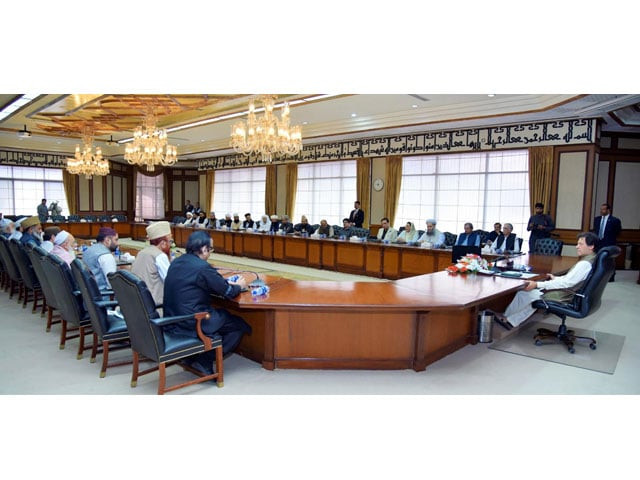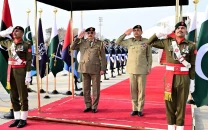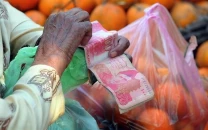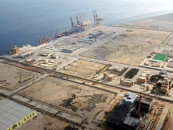Clerics back PM Imran's madrassah reforms agenda
Religious scholars laud Imran for highlighting Kashmir issue globally, Middle East peace efforts

PM meets ulema in Islamabad on Friday. PHOTO: PID
In a meeting at the Prime Minister's House, the religious scholars assured Imran of their full support to the government in its endeavour to develop the country on the model of State of Madina and creation of Naya Pakistan on its principles.
According to statement issued by the Prime Minister's Office, the religious scholars – including representatives of different associations of seminaries – said that they stood by the country and the armed forces of Pakistan for safeguarding the national interests.
The scholars also put forward their suggestions to develop Pakistan as true welfare state on the pattern of the Madina State. They also spoke highly of the government's madrassa reforms and its initiative of modernising the curriculum in accordance with the modern-day needs.
They also appreciated the prime minister's initiative to launch a television channel with the cooperation of Turkey and Malaysia to highlight and apprise the youth of Islamic teachings, saying that it would also help confront the negative propaganda against Islam.
They lauded the prime minister for highlighting the acts of barbarism by the Indian forces in occupied Kashmir at the United Nations. The scholars believed that the prime minister had proved to be the ambassador of Kashmir and also represented the sentiments of all segments of the society.
They said the nation was thankful to the prime minister for boldly presenting a fact-based case of Namoos-e-Risalat and Islam before the world community. They said that the prime minister had become an ambassador of peace with his efforts for de-escalation in Middle East.
Earlier, in his remarks, Imran said the religious scholars had a pivotal role to rid the country of prevailing issues, particularly the uniformity of the education system and promotion of unity. "The government is resolved to take the religious scholars along and seek their guidance," he remarked.
The prime minister said currently there were different educational systems and curricula in vogue, which not only created social division but also misunderstanding among different classes. He stressed the need for educational reforms to bring the national unity and harmony.
For that purpose, the prime minister said, the role of religious scholars was crucial. He added the government desired the students passing out of the seminaries to enjoy the opportunities equal to those by the students of English medium or other schools.
About the development of Pakistan as true welfare state on the pattern of Madina State, Imran said the country's forefathers had dreamed that Pakistan become a state progressing on that very principles. He added that developing Pakistan as a true welfare state on the principles of Madina State was his ultimate goal.
"In order to improve the national economy, the government is introducing tax reforms," he said urging the scholars and the Council of Islamic Ideology (CII) to present their suggestions in light of the Islamic teachings.
Regarding the Kashmir situation, the prime minister said he had raised the issue at every platform and the Indian government knew that the voice of Kashmiris could not be suppressed through the deployment of 900,000 troops.
He said the considering the cognisance of Kashmir issue worldwide, now it was not possible for the Indian regime to subdue the Kashmir people through killings of other tactics. Imran also appreciated the scholars for highlighting the Kashmir issue.
He asked the religious scholars to play their role to address the issues of terrorism and sectarianism. He also sought the scholar's cooperation against the nefarious attempts to create disintegration in the Ummah and resolved to continue his interaction with them for consultation on varying issues.
The meeting was also attended by Foreign Minister Shah Mahmood Qureshi, Defence Minister Pervaiz Khattak, Education Minister Shafqat Mahmood, Religious Affairs Minister Pir Nurul Haq Qadri, special assistants Naeemul Haq, Dr Firdous Ashiq Awan and Yousuf Baig Mirza.
Meanwhile, Imran chaired a meeting regarding better utilisation of properties of the Evacuee Trust Board and directed for removal of all legal and administrative hurdles in the way of an optimum use of trust's properties for public welfare projects.
The prime minister said that the profit gained from such properties could be utilised for construction of schools, colleges, hospitals and promotion of religious tourism. He also directed that the income from the trust properties must be utilised on the provinces where such properties existed.
He directed for drawing a policy for quick disposal of pending cases of Evacuee Property Trust Board (EPTB) besides a comprehensive survey of such properties and preparation of a databank to make a complete business plan about better utilisation of such properties in the urban areas.
The prime minister instructed that the provincial and local governments must provide all possible cooperation regarding retrieving encroached land of the Evacuee Trust from the land mafia. He, however, said that the poor people related to such properties should be taken care of.
The prime minister was informed that a ban had been imposed by a former prime minister through an executive order on giving the properties of Evacuee Trust on lease for businesses and other purposes, as a result the EPTB suffered losses to the tune of billions of rupees. The prime minister gave approval to revoke the executive order after approval by the federal cabinet.
The prime minister fully agreed with a proposal of his Special Assistant Nadeem Babar that agriculture land of more than 1,000 acres of Evacuee Trust could be utilised for industries, solar plants, live stocks, fish farming, sowing of oil seeds etc.
The prime minister was also given a briefing about properties of Auqaf department and administration of Darbars. He said that an automatic system for collection of charities and alms at Darbars be introduced, adding that such step would not only counter corruption in such income but the same amount could also be utilised for facilities and welfare of the devotees.
The meeting was attended by Religious Affairs Minister Pir Noor ul Haq Qadri, Adviser on Institutions Reforms Dr Ishrat Hussain, Punjab Chief Minister Usman Buzdar, Khyber Pakhtunkhwa Chief Minister Mahmood Khan, special assistants Nadeem Babar, Dr Firdous Ashiq Awan and Yousuf Baig Mirza, Chairman Investment Board Zubair Gilani, provincial minister Sayed Saeed ul Hassan, Punjab Chief Secretary Yousuf Khokhar and others.



















COMMENTS
Comments are moderated and generally will be posted if they are on-topic and not abusive.
For more information, please see our Comments FAQ